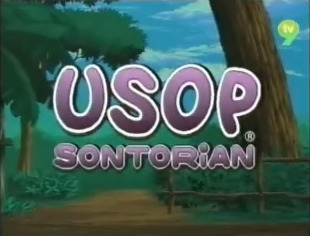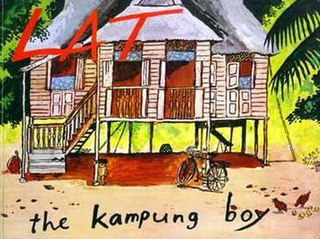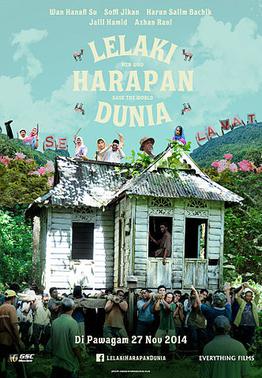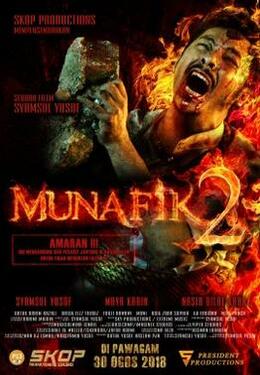Related Research Articles

Dato' Mohammad Nor bin Mohammad Khalid, more commonly known as Lat, is a Malaysian cartoonist. Winner of the Fukuoka Asian Culture Prize in 2002, Lat has published more than 20 volumes of cartoons since he was 13 years old. His works mostly illustrate Malaysia's social and political scenes, portraying them in a comedic light without bias. Lat's best known work is The Kampung Boy (1979), which has been published in several countries across the world. In 1994, the Sultan of Perak bestowed him the honorific title of datuk, in recognition of the cartoonist's work in helping to promote social harmony and understanding through his cartoons. Lat also works for the government to improve the city's social security.

Usop Sontorian is a Malaysian animated cartoon series aired on TV1 from 1996 to 1997. The country's first animated series, it was created by Ujang and produced by Kharisma Pictures. The series was directed by Kamn Ismail, who was also the voice actor for one of the series' characters.

Bukit Kepong incident was an armed encounter in 1950 during the Malayan Emergency between the Federation of Malaya Police and the guerrillas of the Malayan National Liberation Army (MNLA), the armed wing of the Malayan Communist Party (MCP). This conflict took place in an area surrounding the Bukit Kepong police station in Bukit Kepong. The wooden station was located on the river banks of the Muar River, about 59 km from Muar town, Johor.

Bachok District is an administrative division of Kelantan, Malaysia. It is located approximately 25 km east of Kota Bharu.
Mukhsin is a 2006 Malaysian Malay-language romantic drama film directed by Yasmin Ahmad. It is the third instalment in the "Orked" trilogy. Shot in just 12 days, it won one award and one special mention at the 57th Berlin International Film Festival (2007) under the children's film category: International Jury of Generation Kplus - Grand Prix of the Deutsches Kinderhilfswerk for Best Feature Film and the Generation Kplus Children's Jury Awards - Special Mention. Within the first 4 days of its release in Malaysia, it earned RM700,000 in box-office takings. It went on to have a final gross of almost RM2 million.

Pocong is a ghost that looks like a person wrapped in a funeral cloth. In Islamic funeral, a shroud called a "kain kafan" is used to wrap the body of the dead person. The dead body is covered in white fabric tied over the head, under the feet, and on the neck, and the shroud is firmly tied at multiple junctures to maintain its position during the journey to the grave site. Upon placement into the grave, it is believed that the knots must be undone or the corpse will animate and be known as a Pocong. Pocong is also known in Malaysia as Hantu Bungkus.
The Most Esteemed Order of Loyalty to the Crown of Malaysia is a Malaysian federal award presented for meritorious service to the country and awarded by the sovereign.

The Kampung Boy, also known as Lat, the Kampung Boy or simply Kampung Boy, is a graphic novel by Lat about a young boy's experience growing up in rural Perak in the 1950s. The book is an autobiographical account of the artist's life, telling of his adventures in the jungles and tin mines, his circumcision, family, and school life. It is also the basis for the eponymous animated series broadcast in 1999 and a musical theatre staging in 2011. First published in 1979 by Berita Publishing, The Kampung Boy was a commercial and critical success; its first printing was sold out within four months of its release. Narrated in English with a smattering of Malay, the work has been translated into other languages, such as Japanese and French, and sold abroad.

Geng: The Adventure Begins is a 2009 Malaysian Malay-language 3D animated adventure film. Based on the characters created by Les' Copaque, the film was directed by Nizam Razak from the screenplay of his friend, Anas Abdul Aziz and Ehsan Azharuddin and story by Nizam, Anas and Ainon Ariff who served as producer.
The second season of Akademi Fantasia premiered on 7 June 2004 and concluded on 14 August 2004 on the Astro Ria television channel. Aznil Nawawi continued as the show's host, while Kudsia Kahar returned as judges. The second season was won by Ahmad Zahid Baharuddin, who defeated Norlinda Nanuwil. This season also featured Kaer Azami, who would subsequently win the 2008 Malaysian Music Awards for Best Song.

Malay folklore refers to a series of knowledge, traditions and taboos that have been passed down through many generations in oral, written and symbolic forms among the indigenous populations of Maritime Southeast Asia (Nusantara). They include among others, themes and subject matter related to the indigenous knowledge of the ethnic Malays and related ethnic groups within the region.

Men Who Save the World is a 2014 Malaysian Malay-language comedy film written and directed by Liew Seng Tat. The film was nominated for multiple awards in international film festivals, and won several awards at the 27th Malaysian Film Festival, including Best Picture.

Mohd Iznan "Pekin" Ibrahim is a Malaysian actor. He is best known for his roles in the critically acclaimed film Bunohan (2012), Hantu Kak Limah Balik Rumah (2010), Apokalips X,Ophilia, Munafik and Mat Moto ; the last film won him the Malaysia Film Festival award for the Best Actor category, beating other nominees like Shaheizy Sam, Zizan Razak, and Aaron Aziz.
The Distinguished Order of Meritorious Service is a Malaysian federal award presented for meritorious service to the country.

Munafik 2 is a 2018 Malaysian Malay-language supernatural horror film directed and written by Syamsul Yusof. A sequel to Munafik (2016) and the second instalment in a planned Munafik trilogy, the film stars Syamsul himself, Fizz Fairuz, Maya Karin, Nasir Bilal Khan, Fauzi Nawawi, Mawi, Rahim Razali and Indonesian actress, Weni Panca.

Hantu Kak Limah or known as Hantu Kak Limah 3 is a 2018 Malaysian Malay-language horror comedy film directed by Mamat Khalid starring Awie, Zul Ariffin, Uqasha Senrose, Delimawati, TJ Isa and Sharwani NS. It is a sequel to Hantu Kak Limah Balik Rumah (2010) and Husin, Mon dan Jin Pakai Toncit (2013) as well as the third and final film in Hantu Kak Limah film series. The film was released on August 9, 2018 and became a commercial success.
Tiada Tajuk is a 2019 Malaysian Malay-language religious comedy film directed by Mawi in his directorial debut. It tells the story of three young village men who are considered as losers but still chase the dream of becoming singers.

Revenge of the Pontianak, or Dendam Pontianak is a 2019 Singaporean-Malaysian Malay-language romantic horror film directed by Glen Goei and Gavin Yap starring Nur Fazura and Remy Ishak. In the film, a couple and a village is being terrorised by a beautiful Pontianak, who has arrived to take revenge on a guy she loves forever.

Malaysian folklore is the folk culture of Malaysia and other indigenous people of the Malay Archipelago as expressed in its oral traditions, written manuscripts and local wisdoms. Malaysian folklores were traditionally transmitted orally in the absence of writing systems. Oral tradition thrived among the Malays, but continues to survive among Orang Asli and numerous Bornean ethnic groups in Sarawak and Sabah. Nevertheless, Malaysian folklores are closely connected with classical Malay folklore of the region. Even though, Malay folklore tends to have a regional background, with the passing of time, and through the influence of the modern media, large parts of regional Malay folklore have become interwoven with the wider popular Malaysian folklore.